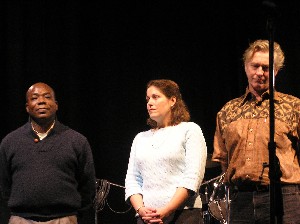Environmental Club Presentation
Students Learn of Conservation
Efforts to Preserve Bonobo
Apes
By Alex Holchek
(October 16, 2005)
Around 120 students attended a talk on Tuesday led by Albert
Lokasola, a Congolese
conservationist, about the
plight of the
bonobo apes found only in
his native
country. Though at the beginning of the presentation, the audience met
the
question “How many of you have even heard of the
bonobos
before?” with a very few raised hands, by the end of the hour-long
talk, that
complete lack of knowledge about humankind’s closest biological
relatives had
been assuaged.

|
Senior Maya Cough-Shulze, the
president of the Environmental Club, was responsible for initiating and
planning the event. Mr. Lokasola began his
presentation by emphasizing that “conservation is like generosity” for
future
generations. He asserted that preservation of wilderness is important
not only
for animals, but for humans, as a place for “spirituality, solitude,
and
renewal for oneself.” The bonobos, he
said, live in
the rainforest of the Congo Basin, which is the richest wildlife
habitat on the
planet after the Amazon River basin. The rainforest is extremely
threatened, Mr.
Lokasola explained.
Two recent civil wars (the last one ended in 2003) in the
Democratic Republic of Congo were fought largely over natural
resources, hastening
the decimation of Congolese rainforests already threatened by human
activity.
|
|
Presenters Mr. Albert Lokasola, Ms. Alison Mize, and Mr.
Michael Hurley were introduced by senior Maya
Cough-Shulze, Environmental Club
president. (Photo by Emily Sanders)
|
This is bad news for the bonobos that live
in the
rainforests, described by Mr. Lokasola as
apes
“distinguished by a peaceful society, intelligence, and loving nature.”
Comparatively
little is known about the bonobos, one of
three
African great ape species, as they were only formally discovered in the
1930s. The
bonobos are also endangered by bushmeat
hunting (poaching) and human population pressures.
More heartening was Mr. Lokosola’s
description of the native Congolese people’s reverence for the bonobos and taboos against bonobo
hunting. It is with these local people and that the bonobos’
best hope lies, he explained. He concluded by speaking about the
students of the
Kokolopori area in which his
conservation efforts are
focused. He described it as “a place where people would like to study,
would
like to learn. But this is difficult” for a number of reasons,
including
shortage of resources as simple as pens and pencils. He described the
assistance of local people disadvantaged by a lack of capital and trade
opportunities
with the outside world as a no less vital cause than protection of the
great
apes that lived in the forests surrounding their villages.
Mr. Lokasola’s
nongovernmental
organization, Vie Savauge, is working with
the
Washington, D.C.-based Bonobo Conservation
Initiative
to help local communities develop. He is also establishing a “Bonobo Bridge” program between American and
Congolese youth
in which the environmental club will participate.
The environmental club is writing letters to
students in the
Congo after school on Monday and hopes to begin a fundraising project
some time
in the future.

